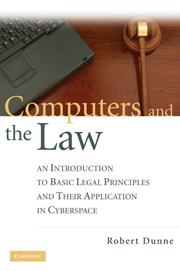Book contents
- Frontmatter
- Contents
- PREFACE
- ACKNOWLEDGMENTS
- 1 THE COMMON LAW AND STATUTORY LAW
- 2 CONTRACTS
- 3 TORTS INTRODUCTION
- 4 DEFAMATION
- 5 THIRD PARTY LIABILITY
- 6 COPYRIGHTS
- 7 TRADE SECRETS
- 8 TRADEMARKS
- 9 THE RIGHT OF PRIVACY
- 10 E-MAIL
- 11 THE RIGHT OF PUBLICITY
- 12 CONSTITUTIONAL LAW
- 13 PORNOGRAPHY AND OBSCENITY
- 14 ADVERTISING AND SPAM
- 15 JURISDICTION
- AFTERWORD
- INDEX
12 - CONSTITUTIONAL LAW
Published online by Cambridge University Press: 05 June 2012
- Frontmatter
- Contents
- PREFACE
- ACKNOWLEDGMENTS
- 1 THE COMMON LAW AND STATUTORY LAW
- 2 CONTRACTS
- 3 TORTS INTRODUCTION
- 4 DEFAMATION
- 5 THIRD PARTY LIABILITY
- 6 COPYRIGHTS
- 7 TRADE SECRETS
- 8 TRADEMARKS
- 9 THE RIGHT OF PRIVACY
- 10 E-MAIL
- 11 THE RIGHT OF PUBLICITY
- 12 CONSTITUTIONAL LAW
- 13 PORNOGRAPHY AND OBSCENITY
- 14 ADVERTISING AND SPAM
- 15 JURISDICTION
- AFTERWORD
- INDEX
Summary
A Constitutional Law Primer and How the First Amendment Fits In
We will focus here largely on First Amendment issues, although we deal with other constitutional issues, such as the Fourth Amendment obviously, in Chapters 9 and 10. Remember that the First Amendment applies only to federal (and state) government restrictions on free speech. It does not apply to restriction on speech by private employers, sysops, or access providers. For example, if AOL refuses to post e-mail critical of its policies that is not a constitutional problem.
Freedom of speech is a fundamental right and as such gets the “strict scrutiny” standard of review. Here is a summary of the standards and what they mean.
Strict Scrutiny
This is the highest standard of review. If the constitutionality of a law is challenged and this standard applies, the government has the burden of proving that the law is necessary for a compelling state interest. This is the standard used in reviewing laws involving “suspect classifications” and fundamental rights.
“Suspect classifications” refer to things like race or ethnicity, for example, so laws classifying people based on such criteria will be reviewed under strict scrutiny. While the burden of meeting the strict scrutiny standard is on the government, the plaintiff or plaintiffs (those challenging the constitutionality of the law) must demonstrate that the law in question has a discriminatory purpose, not merely a discriminatory impact.
The strict scrutiny standard also applies to:
Affirmative action issues. Laws regarding affirmative action issues are usually upheld when the purpose of the law is to correct past identifiable discrimination, not merely some general societal discrimination. If the purpose of the law is to address the latter, it will usually be struck down.
[…]
- Type
- Chapter
- Information
- Computers and the LawAn Introduction to Basic Legal Principles and Their Application in Cyberspace, pp. 268 - 321Publisher: Cambridge University PressPrint publication year: 2009



